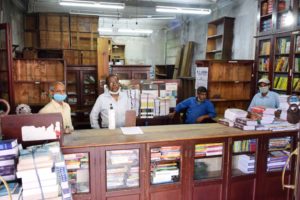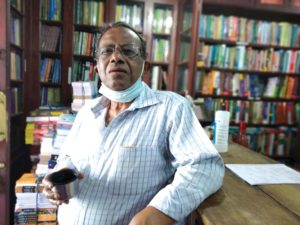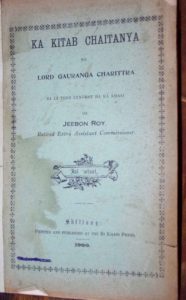The century-old building of the Shillong Banking Corporation on Jail Road is being demolished. The concrete structure had camouflaged itself as the city around it grew robustly in the last few decades. But for Buddhadeb Chaudhuri, the sight of the demolition was disheartening.
Chaudhuri is the current proprietor of Chapala Book Stall, one of the oldest bookstores in the city that once — ‘once’, because the 80-year-old shop is losing its current address with the demolition of the building — fed numerous hungry minds with its vast collection of works in Bengali, Assamese and English. On July 17 afternoon, Chaudhuri was behind the wooden counter in the shop, helping employees shift books to Chapala’s relatively new unit on Keating Road.
Many Bengalis, who grew up in the hill city and witnessed the ageing of Chapala, unanimously say the bookstore was an “institution” in Shillong. Chaudhuri smiled bleakly when this observation was revealed to him; he knew already.
In 1936, a young and educated Bengali, Bibhu Bhushan Chaudhuri, established M/s Chapala Book Stall. The shop was named after his sister who died at a young age. ‘Chapala’ in English means lightning, electrifying and restless, enlightening. There could not have been a better name for a book store that would go on to become, and is still, an important source of the light and power of knowledge.

The banking corporation building became the shop’s permanent address from 1940. Scholars, thinkers, professors and the common man, all rejoiced in a common joie de vivre, reading, at the bookstore.
“My uncle (Bibhu Bhushan) had some regular friends visiting him at the shop every evening. There would be discussions on various topics,” said Chaudhuri. The curved patio outside the shop was the chosen place for such long hours of conversations.
When Chapala came up, the city had two more book stores – Kamala Agency, which is no more, and a Khasi book stall run by an elderly woman, informed Chaudhuri. According to noted city-based thespian and playwright Afzal Husain, Chapala, which has a “long history”, was a reliable source of Bengali books. “Chapala and Kamala were the two main stalls at that time.”
Chapala Book Stall had many stories to tell, which, even Chaudhuri is unaware of as he stayed outside Shillong for several years. It has paeans to sing for its creator, a gifted writer himself, but all these will probably die with the razing of the building.
Bibhu Bhushan was born in Sylhet in 1912 and later completed his college education from there. As a student, he was also involved with the freedom movement. In 1936, along with Chapala, Bibhu Bhushan started other subsidiaries like Asomiya Sahitya Mandir, Charu Sahitya Kutir, Jatiya Sahitya Parishad and Bimal Prakash Bhavan.
Besides running the book business, Bibhu Bhushan was associated with Anandabazar Patrika and Hindustan Standard from 1942-45 as a reporter for the undivided Assam state. He also wrote over 25 books, including two poetry books in Bengali, and edited more than 200 titles in Khasi and Assamese languages. He was the editor of a number of journals, which were published from Shillong, and was associated with many schools in the city, like Lady Keane and Laban Girls’ and Boys’ schools, as member of the managing committees. He was one of the founders of Shillong College.
Bibhu Bhushan was conferred The Shillong Times golden jubilee award in 1996 for his “multifarious contribution to literary and cultural activities of Shillong and the North East”. He died a bachelor at the age of 87.

Chaudhuri became a part of Chapala in 1970 and has been taking his uncle’s legacy forward since.
The elegant double-panelled wooden doors open to a spacious shop with more than two rooms. Hundreds of books would be displayed inside the ceiling-high wooden racks, fitted to the walls, with labellings on the outside to direct buyers on the genres. But on Friday, the doors opened to a room in disarray.
“The shifting of the books started this month and we will be done with it by the end of the month,” Chaudhuri explained the disorder, his voice almost drowning in the monotonous rhythm of destruction upstairs. A few buyers who came into the shop were surprised to know about the knocking down of the building.
Chapala had a publishing section that produced over 250 books in Assamese. Earlier editions of some of the books could be hidden among the piles which were being readied to be sent to the new address.
Chaudhuri pulled out the first editions of an Anglo-Khasi dictionary and a translated work by Babu Jeebon Roy. “These you will not get anywhere now,” he said as he kept the copies of the books on the counter. There are 25 editions of the Anglo-Khasi dictionary printed by Chapala.

Tamal Bhattacharya, a septuagenarian resident of the city, said there were many fond memories of the place. “It was one of the oldest and best stores and we often visited the shop. It was an institution. But where will you find dedicated readers today like the old days,” he added.
Talking about the tepid book business, Chaudhuri said the store sourced its books from Kolkata and Delhi but “business in Kolkata has also gone down”. He rued the decrease in readership and looked worried about the future of Chapala.
“Things have changed over the years and now with the online book business gaining much steam, the competition is tougher. Probably, we too have to opt for online sales to survive in the market. But for that, my children have to take the responsibility,” he said.
Undoubtedly, Chapala is readying for a new journey in a modern world where technology reigns supreme. In the process, it leaves behind a history that is very much a part of the city’s heritage and which will not be lost into oblivion even after its ‘home’ is reduced to debris.
~ Team Sunday Shillong



